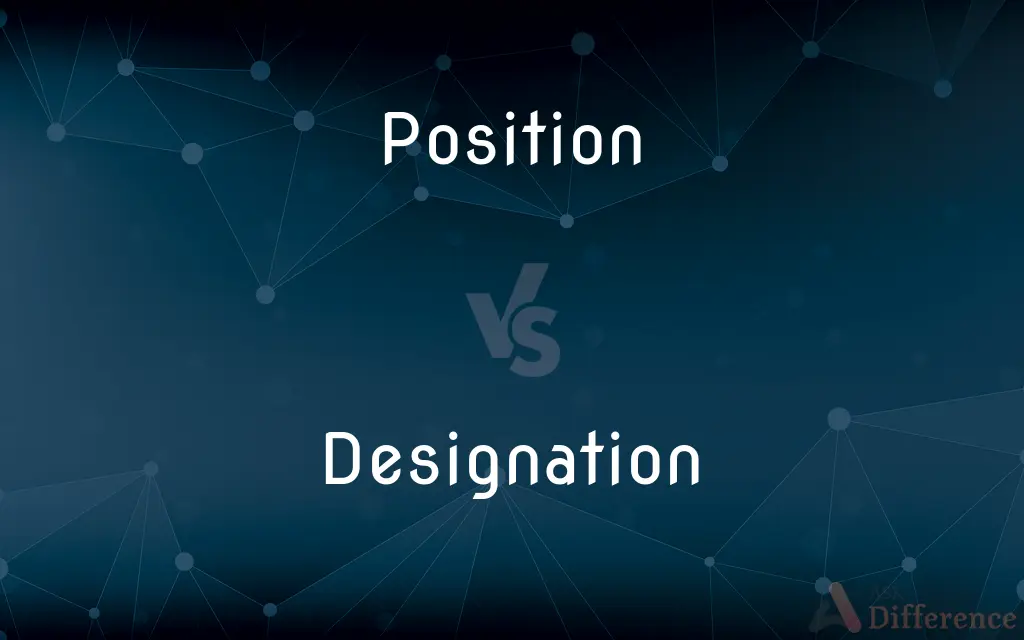Position vs. Designation — What's the Difference?
By Tayyaba Rehman & Urooj Arif — Published on February 4, 2024
Position refers to one's role or status in a context, while Designation is a title or label given to that role.

Difference Between Position and Designation
Table of Contents
ADVERTISEMENT
Key Differences
Position and Designation are terms often used in the workplace to describe aspects of employment but serve different purposes. Position refers to the role or place a person holds within an organizational structure, reflecting responsibilities and duties. Designation, on the other hand, is the title or name given to that role, often signifying rank, office, or profession.
Positions are defined by the tasks, responsibilities, and authority level inherent to the role within an organization. Designations are the formal titles assigned to these roles, which may be used in official communications and representations. For instance, someone's position might be that of a team leader, responsible for overseeing a group of individuals, while their designation could be "Senior Manager."
The concept of position is broader and can apply to any context where individuals hold a role, not limited to professional settings. Designation is more specific to professional titles and ranks, used to formalize the position in terms of organizational hierarchy. A position outlines what a person does, whereas a designation indicates what they are called within the professional sphere.
Positions can change with shifts in responsibility and role within the same organization without a change in designation. Conversely, a designation might change to reflect a new status or rank while the position's core responsibilities remain constant. For example, a promotion might come with a new designation, like "Vice President," but the position in terms of daily tasks might not change significantly.
Understanding the distinction between position and designation is crucial for clarity in organizational communication and structure. While a position describes the role and its duties within the company, the designation is akin to a label that provides a quick understanding of the individual's rank or status within the organization.
ADVERTISEMENT
Comparison Chart
Definition
Role or status in a context
Title or label for a role
Context
Broad, can be non-professional
Primarily professional
Purpose
Describes duties and responsibilities
Formalizes rank or title
Flexibility
Can change with role dynamics
More static, linked to hierarchy
Communication
About function and role
About status and recognition
Compare with Definitions
Position
Position reflects one's role in an organization.
She accepted a position in the marketing department.
Designation
Designation refers to a formal job title.
Her designation at the company is Chief Financial Officer.
Position
A position is defined by responsibilities.
His position involves managing the sales team.
Designation
A designation can signify rank.
He was proud of his designation as Senior Engineer.
Position
Position can refer to a stance on an issue.
Her position on environmental policy is well-known.
Designation
Designations can be honorary or functional.
His designation as Ambassador was a great honor.
Position
A place or location.
Designation
Designations are used in official documents.
Please include your designation on the form.
Position
The right or appropriate place
The bands are in position for the parade's start.
Designation
Designation can denote a special role.
She received the designation of Honorary Member.
Position
A strategic area occupied by members of a force
The troops took up positions along the river.
Designation
The act of designating; a marking or pointing out.
Position
The way in which something is placed
The position of the clock's hands.
Designation
Nomination or appointment.
Position
The arrangement of body parts; posture
A standing position.
Designation
A distinguishing name or title.
Position
In ballet, any of the five arrangements of the arms and feet in which the legs are turned out from the pelvis.
Designation
An act or instance of designating; a pointing out or showing; indication.
Position
An advantageous place or location
Jockeys maneuvering for position.
Designation
Selection and appointment for a purpose or office; allotment; direction.
His designation as chief justice was controversial.
Position
A situation as it relates to the surrounding circumstances
In a position to bargain.
Designation
That which designates; a distinguishing mark or name; distinctive title; appellation.
Position
A point of view or attitude on a certain question
The mayor's position on taxes.
Designation
Signification, meaning, for example of a word or phrase.
Position
Social standing or status; rank.
Designation
The act of designating; a pointing out or showing; indication.
Position
A post of employment; a job.
Designation
Selection and appointment for a purpose; allotment; direction.
Position
(Sports) The area for which a particular player is responsible.
Designation
That which designates; a distinguishing mark or name; distinctive title; appellation.
The usual designation of the days of the week.
Position
The arrangement of the pieces or cards at any particular time in a game such as chess, checkers, or bridge.
Designation
Use or application; import; intention; signification, as of a word or phrase.
Finite and infinite seem . . . to be attributed primarily, in their first designation, only to those things which have parts.
Position
The act or process of positing.
Designation
Identifying word or words by which someone or something is called and classified or distinguished from others
Position
A principle or proposition posited.
Designation
The act of putting a person into a non-elective position;
The appointment had to be approved by the whole committee
Position
A commitment to buy or sell a given amount of securities or commodities.
Designation
The act of designating or identifying something
Position
The amount of securities or commodities held by a person, firm, or institution.
Position
The ownership status of a person's or institution's investments.
Position
To put in place or position.
Position
To determine the position of; locate.
Position
A place or location.
Position
A post of employment; a job.
Position
A status or rank.
Chief of Staff is the second-highest position in the army.
Position
An opinion, stand, or stance.
My position on this issue is unchanged.
Position
A posture.
Stand in this position, with your arms at your side.
Position
(figurative) A situation suitable to perform some action.
The school is not in a position to provide day-care after 4:00 pm.
Position
(team sports) A place on the playing field, together with a set of duties, assigned to a player.
Stop running all over the field and play your position!
Position
(finance) An amount of securities, commodities, or other financial instruments held by a person, firm, or institution.
Long position
Naked position
Position
(finance) A commitment, or a group of commitments, such as options or futures, to buy or sell a given amount of financial instruments, such as securities, currencies or commodities, for a given price.
Position
(arithmetic) A method of solving a problem by one or two suppositions; also called the rule of trial and error.
Position
(chess) The full state of a chess game at any given turn.
Position
(poker) The order in which players are seated around the table.
Position
To put into place.
Position
The state of being posited, or placed; the manner in which anything is placed; attitude; condition; as, a firm, an inclined, or an upright position.
We have different prospects of the same thing, according to our different positions to it.
Position
The spot where a person or thing is placed or takes a place; site; place; station; situation; as, the position of man in creation; the fleet changed its position.
Position
Hence: The ground which any one takes in an argument or controversy; the point of view from which any one proceeds to a discussion; also, a principle laid down as the basis of reasoning; a proposition; a thesis; as, to define one's position; to appear in a false position.
Let not the proof of any position depend on the positions that follow, but always on those which go before.
Position
Relative place or standing; social or official rank; as, a person of position; hence, office; post; as, to lose one's position.
Position
A method of solving a problem by one or two suppositions; - called also the rule of trial and error.
Position
To indicate the position of; to place.
Position
The particular portion of space occupied by a physical object;
He put the lamp back in its place
Position
A point occupied by troops for tactical reasons
Position
A way of regarding situations or topics etc.;
Consider what follows from the positivist view
Position
Position or arrangement of the body and its limbs;
He assumed an attitude of surrender
Position
The relative position or standing of things or especially persons in a society;
He had the status of a minor
The novel attained the status of a classic
Atheists do not enjoy a favorable position in American life
Position
A job in an organization;
He occupied a post in the treasury
Position
The spatial property of a place where or way in which something is situated;
The position of the hands on the clock
He specified the spatial relations of every piece of furniture on the stage
Position
The appropriate or customary location;
The cars were in position
Position
(in team sports) the role assigned to an individual player;
What position does he play?
Position
The act of putting something in a certain place or location
Position
A condition or position in which you find yourself;
The unpleasant situation (or position) of having to choose between two evils
Found herself in a very fortunate situation
Position
An item on a list or in a sequence;
In the second place
Moved from third to fifth position
Position
A rationalized mental attitude
Position
An opinion that is held in opposition to another in an argument or dispute;
There are two sides to every question
Position
The function or position properly or customarily occupied or served by another;
Can you go in my stead?
Took his place
In lieu of
Position
The act of positing; an assumption taken as a postulate or axiom
Position
Cause to be in an appropriate place, state, or relation
Position
Put into a certain place or abstract location;
Put your things here
Set the tray down
Set the dogs on the scent of the missing children
Place emphasis on a certain point
Position
Positions are part of an organizational structure.
They created a new position for digital media.
Position
Position can indicate physical location.
The position of the vase in the room was off-center.
Common Curiosities
What is a position?
A position is the role or status one holds in a context, defined by specific responsibilities and duties.
How does a position differ from a designation?
A position describes the role and responsibilities, whereas a designation is the formal title given to that role.
Can position and designation be the same?
Sometimes they align closely, but often the designation is a formal title while the position describes the role's function.
What does designation mean?
Designation is the official title or label given to a position, often indicating rank or profession.
How is a position determined?
Positions are determined by the needs of an organization, defined by tasks and responsibilities.
Do all positions come with a designation?
In most professional settings, yes, but in informal contexts, a position might not have a specific designation.
Can I have multiple designations in the same position?
Yes, especially if your role encompasses various responsibilities or areas of expertise.
Is a designation permanent?
Designations can change with promotions, role changes, or organizational restructuring.
Can volunteers have designations?
Yes, volunteers can have designations that describe their role or function within an organization.
Is designation more important than position?
Not necessarily; both are important but serve different purposes in organizational context and communication.
Does a higher designation mean more authority?
Often, yes, higher designations usually come with more responsibility and authority.
Can my designation change without my position changing?
Yes, your title can change for various reasons, like a promotion, without significant changes to your daily responsibilities.
How do I know my position in a company?
Your position is typically outlined in your job description and discussed during your hiring process.
Who assigns designations?
Designations are usually assigned by organizational leadership or HR departments based on established criteria.
Why is understanding my designation important?
It helps in understanding your rank and the hierarchical structure within the organization, as well as how you are formally recognized.
Share Your Discovery

Previous Comparison
iPad vs. iPod Touch
Next Comparison
Raisins vs. CurrantsAuthor Spotlight
Written by
Tayyaba RehmanTayyaba Rehman is a distinguished writer, currently serving as a primary contributor to askdifference.com. As a researcher in semantics and etymology, Tayyaba's passion for the complexity of languages and their distinctions has found a perfect home on the platform. Tayyaba delves into the intricacies of language, distinguishing between commonly confused words and phrases, thereby providing clarity for readers worldwide.
Co-written by
Urooj ArifUrooj is a skilled content writer at Ask Difference, known for her exceptional ability to simplify complex topics into engaging and informative content. With a passion for research and a flair for clear, concise writing, she consistently delivers articles that resonate with our diverse audience.
















































